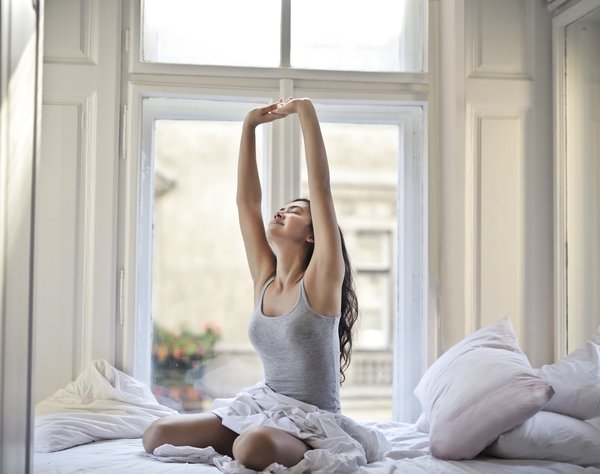If you find that you struggle with getting enough sleep more in the summer than during any other season, you are not alone. The long, hot days and late nights out with family and friends can take a toll on sleep health.
Many people suffer from summer insomnia, a seasonal version of insomnia, which affects people throughout the year. There isn't a lot of research on it, but sleep experts say certain factors can contribute to the loss of ZZZ's in the summer months.
- MORE HEALTH
- Summer skin care requires more than just sunscreen, dermatologists say
- New fathers can get postpartum depression, but their risk factors and symptoms often differ from mothers
- Struggling with FOMO? Muting your smartphone may make it worse
For some people, the longer hours of sunlight are simply messing with their body's natural circadian clock. When people soak up sunlight, or even artificial light, late into the evening, their bodies don't produce enough melatonin, a hormone that signals to the body that it is bedtime, sleep specialists say.
"With the sun coming up earlier there's a natural tendency to wake up or to experience disturbed sleep from now until late summer," Victoria Revell, a senior lecturer in translational sleep and circadian physiology at the University of Surrey in England, told The Times. "Too much light in the evening also makes it harder to get to sleep so that total sleep duration is compressed."
For others, particularly people who lack air conditioning, the hot temperatures could be to blame. The body has a natural cooling effect that prepares it for deep, more restorative sleep, but hot weather can mess with this, leading to uncomfortable nights of tossing and turning.
Lifestyle changes during the summer also play a role. Summer vacations and social events prompt many people to spend more time outdoors and more frequently stay out late. They may even drink or eat later in the evening than they do the rest of the year. This not only makes it harder to fall asleep, but it also affects sleep quality, experts say.
How to get more sleep
The key to better slumber in the summer is to stay consistent with your sleep routine, sleep experts say. While it is tempting to burn the midnight oil on vacation, the best strategy for good sleep is to go to bed and wake up at the same time every day.
The Sleep Foundation recommends following a bedtime routine to signal to your body that it is time to sleep. To prepare for sleep, turn off all electrical devices and dim any lights about an hour or two before you want to fall asleep. Do something quiet, like reading a book or taking a bath. As your body slowly relaxes – avoid exercising too late in the evening – it will be easier to switch to sleep mode.
A warm shower before bed may seem counterintuitive in the summer, but Carleara Weiss, a scientific adviser at Aeroflow Sleep, says it can help you relax.
"Interestingly, a warm shower is more effective than a cold one to support sleep," she told Woman's World. "This is because during a warm shower, the body temperature increases. As a result, right after the shower, the natural thermoregulation process will bring body temperature to a lower point. A decrease in body temperature gives a sleep signal to the brain."
In the morning, pull back the shades as soon as you wake up and make sure to get outside into the natural sunlight periodically. Greeting the sun in the morning will make you feel more alert and capable of taking on the day.
One study found that people who were exposed to light in the morning hours slept better than those who were not.
Philip Gehrman, a clinical psychologist at the Penn Sleep Center at the University of Pennsylvania, told the New York Times that sunlight exposure not only wakes people up, but also strengthens their circadian clocks so they sleep better at night.
For a more restful sleep, keep your bedroom temperature between 60 to 67 degrees. And avoid naps, Dr. Dr. Cameron Johnson, a psychiatrist at Loma Linda University Health in California recommnds. If you absolutely need a nap, keep it short – about 15 to 20 minutes – and before 2 p.m. A later nap will interfere with your regular bedtime.
Sleep experts also recommend not eating large meals or consuming caffeine or alcohol close to bedtime. Even though you might fall asleep quickly after a few drinks, you are also more likely to wake frequently during the night and have poorer quality sleep.
Alcohol decreases deep sleep, Dr. David Brodner, a sleep specialist and founder of the Center for Sinus, Allergy and Sleep Wellness in Palm Beach County, Florida told Insider. This is the part of the sleep cycle when the brain consolidates memories and sorts out all of the day's information.
The bottom line is that a lack of sleep is bad for your health, so don't ignore the problem. Poor sleep not only affects the ability to concentrate and focus, but it also has been linked to serious health conditions such as type 2 diabetes, obesity, high blood pressure, heart disease, stroke and depression.
If none of these strategies seem to work for you, a sleep specialist can help get to the bottom of your summer insomnia.


